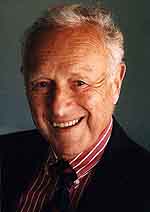
| T H E N I H C A T A L Y S T | J A N U A R Y – F E B R U A R Y 2002 |
|
|
|
NEW FAES COURSE:DEMYSTIFYING CLINICAL MEDICINE FOR PH.D. SCIENTISTS |
|
 |
|
Win
Arias
|
"Demystifying Medicine for Ph.D. Students, Fellows, and Staff," a new course offered at the FAES Graduate School (Medi 552), is based on a successful similar venture developed and conducted by Win Arias at Tufts School of Medicine in Medford, Mass., for the past 15 years. The course will begin on January 29th and continue twice weekly (Tuesday and Thursday 4:00–5:30 p.m.) until mid-May. Enrollment is limited to 170 students (who must have a Ph.D. or be in a Ph.D. program). Registration is required.
The goal is to "demystify medicine" for basic scientists through clinical presentations of patients, their pathology, and the diagnostic and therapeutic advances relevant to their cases that are linked to advances in basic biology. The course will be conducted by clinical and basic scientists and directed by Arias, who is currently an NIH Fogarty Scholar (see "A Win-Win Situation," The NIH Catalyst, September–October 2001).
The curriculum includes approximately 20 major diseases and related basic biologic advances. A tentative schedule appears below and at the web site.
The course is designed to bridge the ever-increasing gap between advances in basic biology and their application to human disease. Typically, Ph.D. scientists do not receive training in pathobiology and have little understanding of clinical disease, advances in diagnosis and therapy, and the major unsolved clinical problems that challenge basic research.
Not only is learning its own excuse for being, but there is also a practical aspect to taking this course. Because of the decline in physician-scientists, more tenure-track positions in clinical departments in many of the nation’s best medical schools are available for Ph.D. scientists with the clinical background offered in a course like this.
In such academic settings, Ph.D. scientists work with rather than for physician-scientists. One third of the graduates of the one-semester course in Pathobiology at Tufts have tenure-track positions in outstanding clinical departments (and most others have traditional academic and industrial positions).
For more information,
contact Arias. ![]()
| Jan. 29 Jan.31 |
T Th |
Masur Bldg. 50 |
Steve Holland John Robbins |
Global Infections Vaccines To Prevent Them |
| Feb. 4 Feb. 7 |
T Th |
Masur Bldg. 50 |
Cliff Lane John Coffin |
AIDS: The Disease HIV: The Virus |
| Feb. 11 Feb. 14 |
T Th |
Masur Bldg. 50 |
Tiren Finkel Brian Brewer |
Atherosclerosis: The #1 Disease Cholesterol Biology: The Good and the Bad |
| Feb. 19 Feb. 21 |
T Th |
Masur Bldg. 50 |
Bob Balaban Bob Adelstein |
Cardiac Diagnosis in the 21st Century Myosins: Essential Components |
| Feb. 26 Feb. 28 |
T Th |
Masur Bldg. 50 |
Joel Moss Joel Moss |
The Major Lung Diseases Genetics of Lung Disease |
| Mar. 5 Mar. 7 |
T Th |
Masur Bldg. 50 |
Bill Gahl Juan Bonifacino |
Lysosomal Diseases and Novel Therapies Lysosomal Biology |
| Mar. 12 Mar. 14 |
T Th |
Masur Bldg. 50 |
Phil Gordon/Mark Reitman Ron McKay/SnorriThorgeirsson |
Diabetes and Obesity Stem Cells |
| Mar. 19 Mar. 21 |
T Th |
Masur Bldg. 50 |
David Harlan Polly Matzinger |
Transplantation Immune Recognition of Allografts |
|
Mar. 26 |
T Th |
Bldg. 50 Bldg. 50 |
Warren Strober John Robbins |
Inflammatory Bowel Disease The Infectious Etiology of Autoimmunity |
| Apr. 2 Apr. 4 |
T Th |
Bldg. 50 Bldg. 50 |
Harvey Alter Joe Grisham |
Hepatitis Viruses and Liver Disease Liver Regeneration |
| Apr. 9 Apr. 11 |
T Th |
Bldg. 50 Bldg. 50 |
Jay Hoofnagle/Win Arias Curt Harris/Snorri Thorgeirsson |
Hepatocellular Cancer: The Disease Hepatocellular Cancer: Mechanisms |
| Apr. 16 Apr. 18 |
T Th |
Masur Bldg. 50 |
Marston Linehan Tom Waldmann |
Inherited and Acquired Renal Cancer Lymphoid Growth Factors: Treatment |
| Apr. 23 Apr. 25 |
T Th |
Masur Bldg. 50 |
Alan Wayne Carole Thiele |
Leukemias Cell Cycle: Biology and Therapeutic Targets |
| Apr. 30 May 2 |
T Th |
Bldg. 50 Bldg. 50 |
Lyuba Varticovski Ira Pastan |
Lymphoma Causes and Cures Immunotoxins: A Novel Therapeutic Strategy |
| May 7 May 9 |
T Th |
Bldg. 50 Bldg. 50 |
Susan Bates Michael Gottesman |
Anti-Cancer Drug Resistance: A Major Issue Cellular and Molecular Mechanisms of Drug Resistance |
| May 14 May 16 |
T Th |
Bldg. 50 Bldg. 50 |
Steve Rosenberg Lance Liotta |
Immunotherapy of Melanoma Molecular and Cellular Basic of Metastasis |
| May 21 May 23 |
T Th |
Bldg. 50 Bldg. 50 |
Rick Klausner/Tom Cech | Role of Ph.D.s in Biomedical Rresearch |
| INTRO TO TECH TRANSFER |
|
An intro to tech transfer course (Genl 313), will be held Tuesdays from 5:30 to 7:30 p.m.. Topics include intellectual property, definitions of a patentable invention and an inventor, collaborative research, the patent application process, and patent litigation, infringement and interference. Special topics include third party considerations in natural products development. For registration information, see the FAES Spring Catalog. Classes start Jan. 29 and will be held at the Office of Technology Transfer, 6011 Executive Boulevard, Suite 325, Rockville, MD 20852. Note: Late
registration for classes at the FAES Graduate School will be accepted
at the school’s office (one Cloister Court/Building 60, Suite 230)
until March 8 with a $10 late fee. |